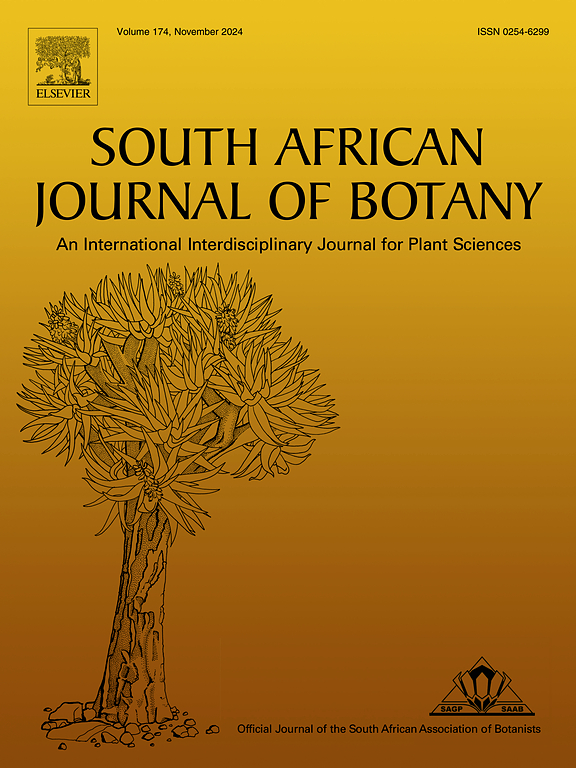蓝细菌接种通过调节小麦植株生长、光合性能、元素浓度和产量来缓解盐胁迫
IF 2.7
3区 生物学
Q2 PLANT SCIENCES
引用次数: 0
摘要
盐度胁迫是对全球农业生产力的重大威胁,尤其影响干旱和半干旱地区的作物产量。蓝藻(BGA)为恢复受盐影响的土壤提供了一种环保的解决方案。本研究探讨了接种BGA缓解小麦盐胁迫的潜力。研究了4种BGA菌株(Jaaginema pseudogeminatum、Lyngbya austeri、Nostoc hatei和Phormidium tenue)在0、4、8和12 dS m-1 NaCl条件下对小麦生长、生理性能和产量的影响。目的是评估BGA通过提高养分吸收、光合效率和水分利用效率(WUE)来增强小麦抗盐能力的能力。结果表明,盐胁迫显著降低了小麦的生长和产量,但接种BGA可缓解这些不利影响。在12 dS - m-1盐度下,黄颡鱼的净光合速率提高了210%,水分利用效率提高了185%,总酚含量提高了101%。此外,接种BGA减少了植株的Na积累,同时增加了N、K和Ca的吸收。BGA对小麦植株干重、可育颖花数和千粒重等形态性状也有改善作用。在这些菌株中,P. tenue对减轻盐渍化对小麦的负面影响最为有效。结果表明,接种BGA可以通过改善养分有效性、光合性能和渗透调节来提高小麦的耐盐性。这种生态友好的方法为盐渍环境中受盐渍影响的土壤和提高作物生产力提供了可持续的解决方案。建议在不同环境条件下进行进一步的实地研究,以验证这些结果,并探索BGA在可持续农业中的更广泛应用。本文章由计算机程序翻译,如有差异,请以英文原文为准。
Cyanobacteria inoculation mitigates salinity stress by regulating plant growth, photosynthetic performance, elemental concentrations and yield in wheat
Salinity stress is a significant global threat to agricultural productivity, particularly affecting crop yields in arid and semi-arid regions. Cyanobacteria (BGA) offer an environmentally friendly solution for the recovery of salt-affected soils. This study investigated the potential of BGA inoculation to mitigate salinity stress in wheat. Four BGA strains (Jaaginema pseudogeminatum, Lyngbya austeri, Nostoc hatei, and Phormidium tenue) were evaluated for their effects on wheat growth, physiological performance, and yield under saline conditions (0, 4, 8, and 12 dS m-1 NaCl). The objective was to assess the ability of BGA to enhance wheat resilience to salinity through improved nutrient uptake, photosynthetic efficiency, and water use efficiency (WUE). The results indicate that salinity stress significantly reduced wheat growth and yield, but BGA inoculation alleviated these adverse effects. P. tenue increased the net photosynthetic rate by 210 %, WUE by 185 %, and total phenol content by 101 %, at 12 dS m-1 salinity. Additionally, BGA inoculation reduced Na accumulation in plants while enhancing N, K, and Ca uptake. Morphological characteristics of wheat, such as plant dry weight, number of fertile spikelets, and 1000-seed weight, were also improved with BGA application. Among the strains, P. tenue was the most effective in mitigating the negative effects of salinity on wheat. The findings demonstrate that BGA inoculation can enhance wheat's tolerance to salinity by improving nutrient availability, photosynthetic performance, and osmotic adjustment. This eco-friendly approach offers a sustainable solution for reclaiming salt-affected soils and improving crop productivity in saline environments. Further field studies are recommended to validate these results under diverse environmental conditions and to explore the broader application of BGA in sustainable agriculture.
求助全文
通过发布文献求助,成功后即可免费获取论文全文。
去求助
来源期刊

South African Journal of Botany
生物-植物科学
CiteScore
5.20
自引率
9.70%
发文量
709
审稿时长
61 days
期刊介绍:
The South African Journal of Botany publishes original papers that deal with the classification, biodiversity, morphology, physiology, molecular biology, ecology, biotechnology, ethnobotany and other botanically related aspects of species that are of importance to southern Africa. Manuscripts dealing with significant new findings on other species of the world and general botanical principles will also be considered and are encouraged.
 求助内容:
求助内容: 应助结果提醒方式:
应助结果提醒方式:


